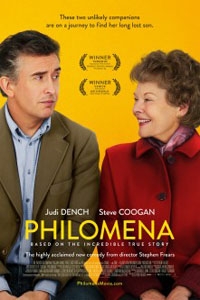 Philomena
Philomena
Starring: Judi Dench, Steve Coogan, Sophie Kennedy Clark, Mare Winningham, Barbara Jefford
Directed by: Stephen Frears
Rated: PG-13
Run Time: 98 minutes
Genre: Drama
Opens November 27th
by Eric Forthun of Cinematic Shadows
Every so often a film comes along that delights in such a subtle manner that we only realize days after watching just how wonderful it is. Philomena, through terrific performances from Judi Dench and Steve Coogan, falls perfectly into that category as a quiet charmer that I realize now is one of the most tenderly orchestrated features of the year. Based on the 2009 true story, the movie centers on Philomena Lee’s (Judi Dench) journey to America with investigative journalist Martin Sixsmith’s (Steve Coogan) to find her son she gave up for adoption 50 years ago under her stay in a nunnery. As a teenage mother carrying a child out of wedlock, she was shunned by her family and treated irrationally by the nuns who took care of her; when her son is taken away from her when he’s only three years old and sent off to America with a rich family, she is devastated. The young Philomena, played by Sophie Kennedy Clark, met a young man at a carnival and young love swept her up in those moments; Clark allows for an intimacy that only becomes further explored through Dench.
Sixsmith is a frowned-upon journalist who is hoping to rebound, constantly telling people that his next book will be about Russian history. People do not seem that interested in that endeavor because, frankly, Sixsmith does not have a particular investment in the material. That’s where the film begins to explore his character, and Coogan lends himself terrifically to the role. Co-writing the script with Jeff Pope, Coogan navigates what could have genuinely been an uninteresting figure, one wallowing in boredom; Sixsmith is not a particularly funny man in the film, which is off-putting considering how talented Coogan is as a comedian. I see his journalist as a man who begins to battle with his own perception of life as he notices how religious Philomena remains throughout all of her struggles. Even upon uncovering everything that has happened to her son and what the nuns have done over the years, she continues to trust God. Director Stephen Frears recognizes this strong belief system behind her character and never shoots her in an unflattering way; the movie may seem a bit singular in its viewpoint, but he keeps the film focused.
There’s a beauty to Philomena and her way of living. Here’s one of the most delightfully kind and intelligent characters I’ve seen all year, played with grace and heart by Dench in one of the year’s finest performances. Some of the film’s most compelling moments emerge from conversations between Philomena and Sixsmith discussing religion and the impact it has on their lives. Philomena believes in God, even after the injustices committed by the nuns (however extreme they were), and Sixsmith is an atheist who cannot seem to grasp her commitment to the church. Yet in one of the film’s closing scenes, as the true spirit of the nuns finally comes forth, the hate that spews from Sixsmith is not marked only by his disapproval of the church, but by their maltreatment of a woman as remarkable as Philomena. And even through these moments, Philomena recognizes the strength that can be found in religion, along with the hate that it can create. The friendship at the center of Philomena, as it becomes the film’s strongest element, helps it shine as bright as Philomena’s smile. This is a modestly beautiful, heartwarming film.









